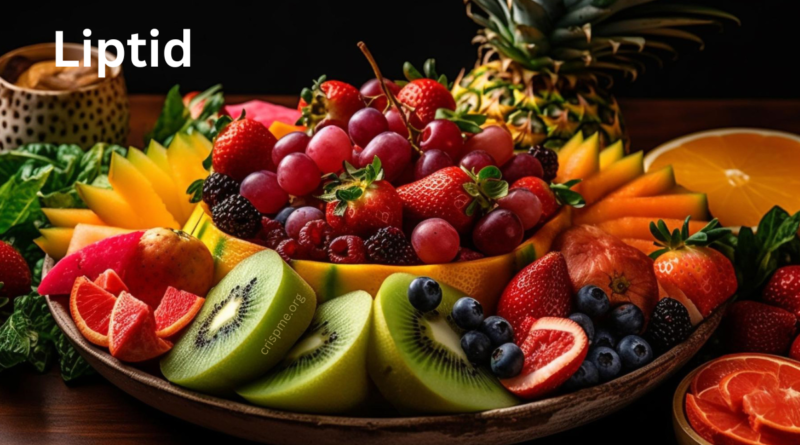Liptid: An Essential Nutrient for Health and Well-being
Introduction
Lipids, sometimes referred to as lipidosis, are vital nutrients that are vital to the preservation of our general health and wellbeing. Triglycerides, phospholipids, and sterols are the three primary categories of these chemical molecules, which are present in both plants and animals. Because they all perform essential bodily functions, liptids are an essential part of our daily diet. This page explores the significance of liptid, as well as its sources, advantages, and dietary incorporation options.
Liptid Types and Functions
Liptid are essential for several body processes. With nine calories per gramme, triglycerides are the most prevalent type of fat in the body and a major source of energy. Since phospholipids are the major building block of cell membranes, they are essential for preserving the integrity and structure of cells. Sterols, such as cholesterol, are necessary for the synthesis of several hormones and are crucial in controlling the production of hormones. The fat-soluble vitamins A, D, E, and K are also transported and absorbed by liptid and are essential for a number of physiological functions. In addition, they regulate temperature and serve as insulators.
Liptid’s sources
A wide range of foods derived from plants and animals include it. Avocados, nuts & seeds, fatty fish, eggs, dairy products, and meat are a few great sources. For the best possible health advantages, pick unsaturated fats—like those in avocados and olive oil—instead of saturated and trans fats, which are frequently found in processed and fried meals.
The Health Advantages of Liptid
Liptid intake has a number of health advantages. One major benefit is that unsaturated fats can help lower harmful cholesterol levels and the risk of heart disease, which can improve heart health. Given that the brain needs healthy fats to operate properly, it also improves brain function. Additionally, by preserving moisture and promoting cell regeneration, they help to maintain healthy skin and hair. It can help manage illnesses including arthritis by reducing inflammation. Lastly, they enhance the body’s ability to absorb vitamins A, D, E, and K, which are critical for healthy bones, immunity, and vision.
Including Liptid in Your Nutrition
It’s crucial to carefully include it in your diet if you want to profit from it. Choose unsaturated fat sources that are good for you, such as fatty fish, avocados, nuts, and seeds. For cooking, use oils like avocado or olive oil, which offer healthy fats without the drawbacks of trans and saturated fats. A simple and quick approach to up your intake of healthy fats is to add nuts and seeds to salads, yoghurt or muesli.
Conclusion
Liptids are essential nutrients that have a wide range of functions in our bodies, including supplying energy, preserving cell structure, and controlling physiological processes. For general health, it is important to consume liptid in moderation, especially from good unsaturated sources. We may take advantage of the many advantages that liptid offers by choosing the right kinds of fats for our diet, which can help with better nutrient absorption, reduced inflammation, improved heart health, and healthy skin and hair. Achieving and sustaining maximum health and well-being requires adopting a diet high in healthy fats.
FAQs
What do liptid mean?
Lipids, also referred to as fats, oils, and cholesterol, are vital nutrients. They are essential for supplying energy, preserving the integrity of cells, and sustaining a number of biological processes.
What varieties of liptid are there?
Sterols, phospholipids, and triglycerides are the three primary forms of them. Each kind performs distinct functions in the body, including hormone production, cell membrane construction, and energy storage.
Why are liptids crucial to our overall health?
In addition to supplying energy, it also maintain cell structure, control hormones, facilitate the absorption of vitamins, and insulate the body. They also support the health of the brain, skin, and hair.
Which are the best places to get liptid?
Avocados, nuts & walnuts, fatty fish, eggs, dairy products, and meat are good sources of it. For optimum health, unsaturated fats are preferable to saturated and trans fats.
What dietary changes can I make to include more liptid?
By selecting healthy unsaturated fat sources like avocados, nuts, seeds, and fatty fish, you can increase the amount of it in your diet. When cooking, use oils like avocado or olive oil. You may also add nuts and seeds to salads, yoghurt and porridge.
What advantages can eating liptid have for your health?
There are many health advantages to consuming it, such as higher vitamin absorption, lower inflammation, healthier skin and hair, stronger heart health, and improved brain function.
Are there any dangers involved in eating liptid?
Although lipids are necessary for good health, consuming too much of them, particularly trans and saturated fats, can result in obesity and heart disease. It’s crucial to find healthy sources and consume it in moderation.
Is liptid beneficial for controlling weight?
Yes, it, which promotes metabolic processes and satiety, can aid in weight management. Nonetheless, it’s critical to maintain a balanced diet and exercise regimen, as well as to balance lipid intake with overall calorie intake.




